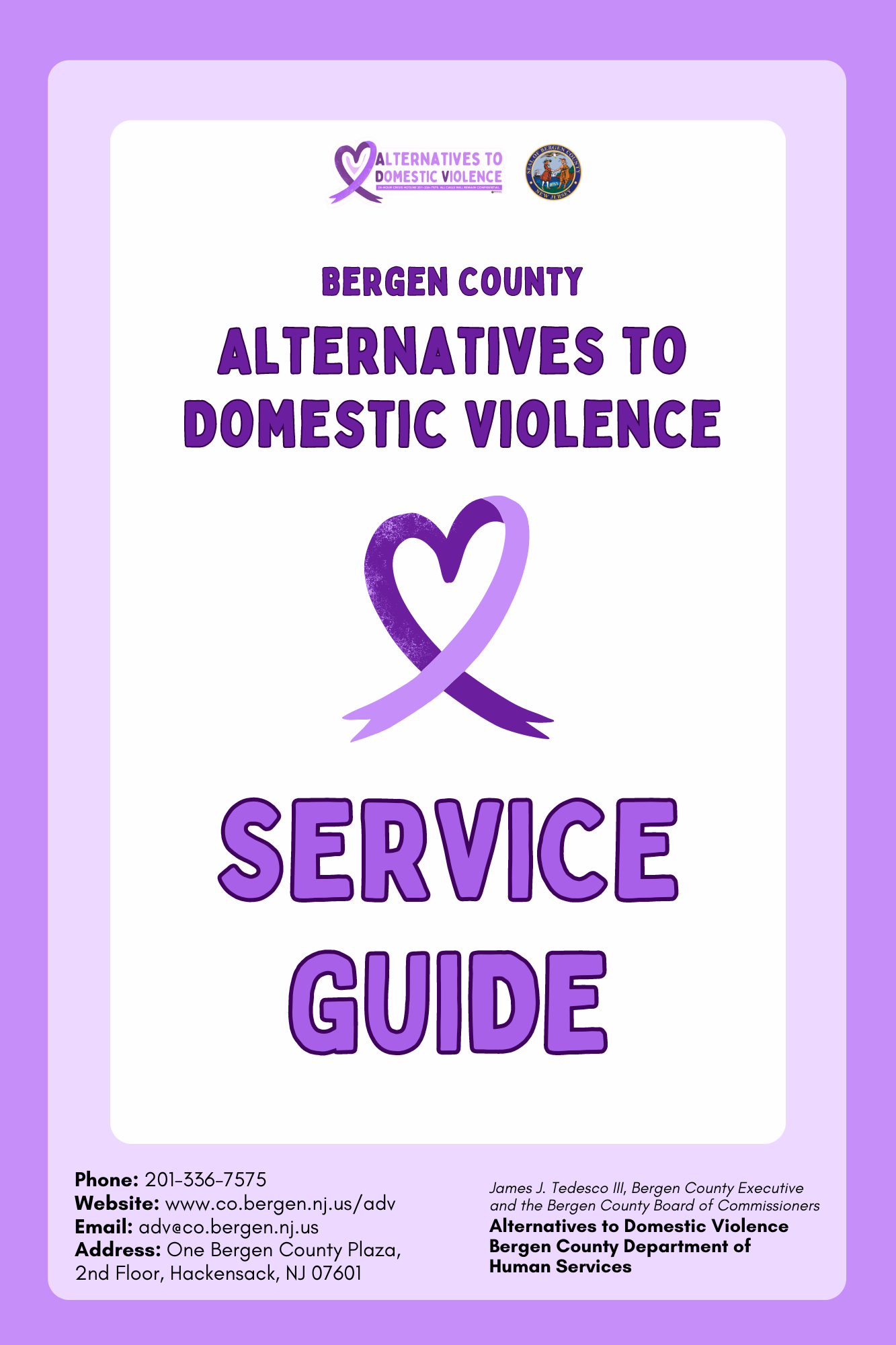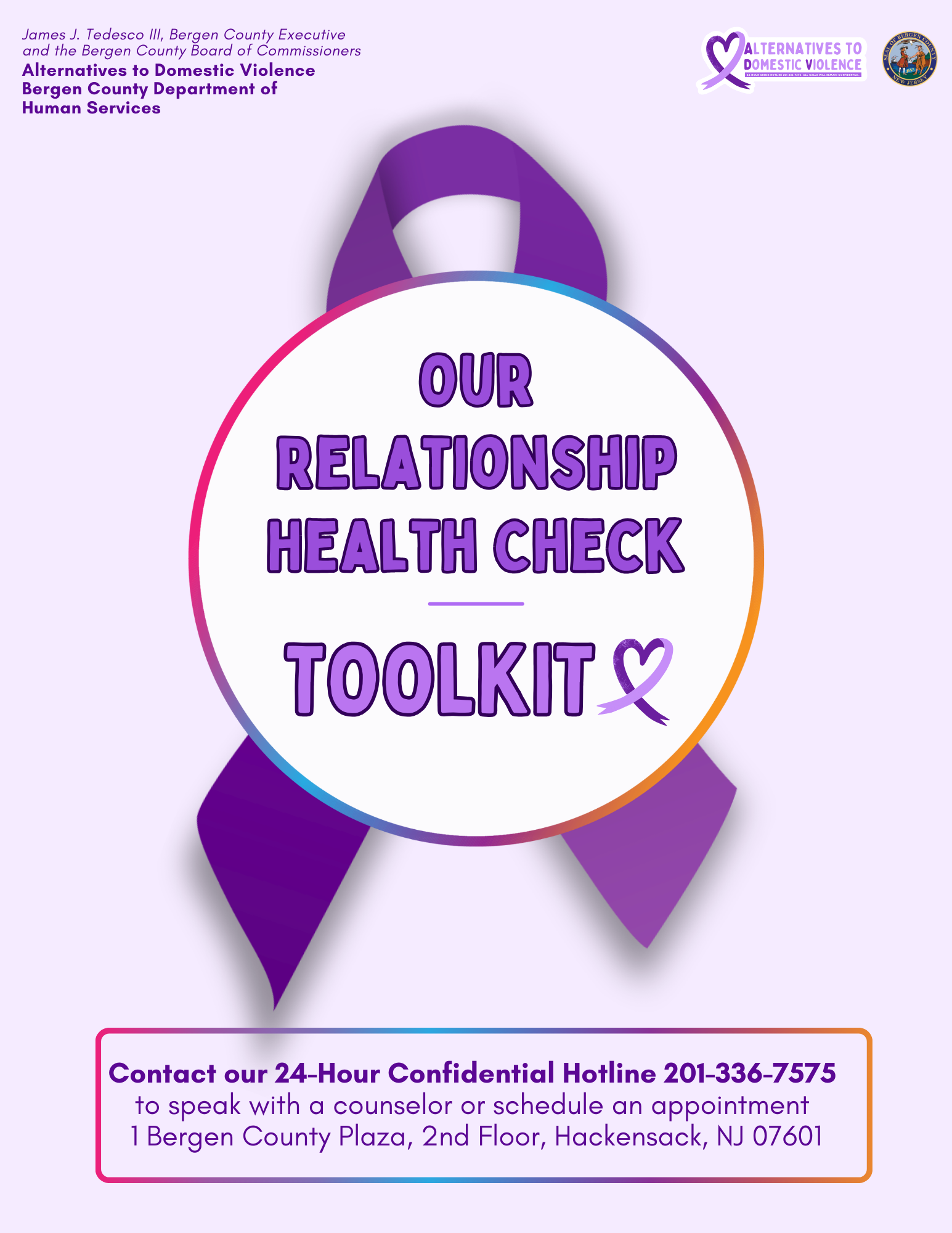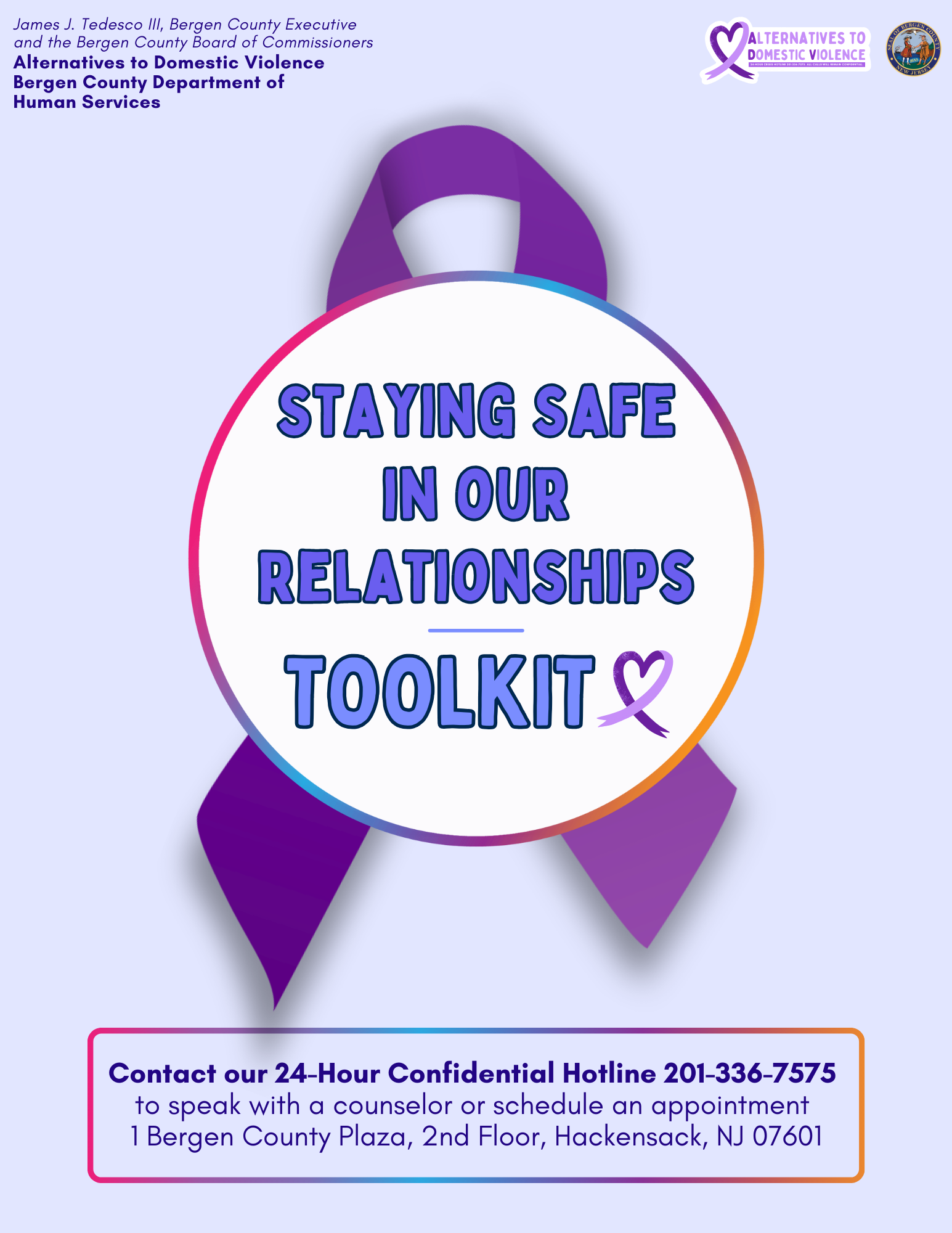Resource Guides for Survivors of Domestic Violence in Bergen County

Community Resource Guide
A comprehensive guide on resources in Bergen County that addresses the needs of a person as a whole

Service Guide
A guide to the services ADV has to offer.
Would you like to speak to someone?
You are not alone - help is available. ADV’s domestic violence counselors and advocates are available to speak to you confidentially 24 hours per day, 7 days per week, 365 days of the year by calling our hotline: 201-336-7575.
Not sure if we’re the right agency to help?
You can also speak to someone confidentially at either one of the following hotlines:
LOCAL
- Alternatives to Domestic Violence Hotline - Call 201-336-7575
- Center for Hope and Safety – Call 201-944-9600
- YWCA Northern New Jersey healingSPACE Hotline - Call 201-487-2227
NATIONAL
- Domestic Violence Hotline - Call 800-799-SAFE (7233) or Text START to 88788
OTHER HELPFUL HOTLINES & RESOURCES
-
988 Suicide and Crisis Lifeline – Call or Text 988
The 988 Lifeline provides 24/7, free and confidential support for people in distress, prevention and crisis resources for you and your loved ones, and best practices for professionals in the United States. -
NJ Hopeline – Call 1-855-654-6735
The New Jersey Suicide Prevention Hopeline (NJ Hopeline) provides 24/7, free confidential support, assessment, and if needed, intervention in the most cooperative and least restrictive manner to New Jersey residents in emotional distress and suicidal crisis. -
Crisis Text Line – Text HOME to 741741
Crisis Text Line provides free, 24/7 crisis intervention and mental health support via text message.
STATE
- New Jersey Domestic Violence Hotline – Call 800-572-7233
- 2NDFLOOR Youth Helpline – Call or Text 888-222-2228
2NDLFOOR is a confidential and anonymous helpline for New Jersey’s youth and young adults between the ages of 10 and 24. They are here to help youth find solutions to problems that they face at home, at school, or at play. - The Trevor Project – Call 1-866-488-7386 or Text START to 678-678
The Trevor Project provides 24/7 crisis support services to LGBTQ young people. Text, chat, or call anytime to reach a trained counselor. - Trans Lifeline Hotline – Call 877-565-8860
The Trans Lifeline Hotline is a 24/7 free, confidential peer support phone service run by trans people for trans and questioning peers. Community members may call if they need someone to talk to, even if they are not in a crisis or if they are not sure they are trans.
Educational Toolkits & Safety Planning Aids
Do you need assistance with safety planning? Call our 24/7 Crisis Confidential Hotline at 201-336-7575
Unable to speak to someone right now?
You can create your own personal safety plan using thehotline.org’s interactive guide.
 The interactive guide to safety planning requires you to enter information into an online form. At the end of the process, you will have a printable version of your personalized safety plan that you can reference whenever you need it. You can read it online, print it immediately, or have a link sent to your email. The link will be active for 24 hours; after that, your information will be deleted from the website. Before you begin, be sure that the computer you are using is in a safe location and is not being monitored by your partner. For more tips on how to stay safe while using the internet and technology, go to our Digital Safety page.
The interactive guide to safety planning requires you to enter information into an online form. At the end of the process, you will have a printable version of your personalized safety plan that you can reference whenever you need it. You can read it online, print it immediately, or have a link sent to your email. The link will be active for 24 hours; after that, your information will be deleted from the website. Before you begin, be sure that the computer you are using is in a safe location and is not being monitored by your partner. For more tips on how to stay safe while using the internet and technology, go to our Digital Safety page.
Once you complete your safety plan, be sure to keep it in an accessible but secure location. Click here to leave ADV’s website and go to thehotline.org’s interactive safety plan page.
Want to learn more about domestic violence?
Domesticshelters.org is a great resource to victims and survivors of domestic violence looking for safehouse, shelter, and other supportive programs based on location, services, and language. It also provides community members and domestic violence professionals with education and training on the latest statistics, articles, literature, and resources about domestic violence and dating abuse. ADV is excited to share some of their resources below.
Before you begin exploring, be sure that the computer you are using is in a safe location and is not being monitored by your partner.
Frequently Asked Questions
Detecting and Responding to Domestic Violence & Dating Abuse
Stalking doesn’t always occur by someone you’ve dated and it doesn’t make it less serious. Sometimes possessive and obsessive behaviors are directed towards persons that have never returned these feelings and it can feel very disturbing and disruptive for victims to experience this type of stalking. Stalking can involve any behavior (for example, contacting us, following us, monitoring our activities, interacting with our social media, giving us gifts, or fishing for information about you from third parties, etc.) that we find insistent and persistent despite our efforts to get them to stop. You can be very firm and clear about you wanting them to stop-this can be done in person or online. If the behaviors continue, get in touch with us at ADV (201-336-7575) as we can help you go over next safety planning steps, which can include safeguarding your information and getting others involved in interrupting the stalker’s behaviors. We can also recommend this amazing resource from www.StalkingAwareness.org that has specific examples of how to respond to stalking behavior, how to collect evidence, and how to stay safe at school or at home.
Family Concerns
A relationship is allowed to go through changes where sometimes it feels good and other times it feels harder. A healthy relationship can make us feel highs, lows, and uncomfortable at times because we are being challenged to trust someone else, share control with them, and practice being vulnerable with them. However, it shouldn’t make us feel sad, anxious, or overwhelmed most of the time. We shouldn’t feel like we can’t be ourselves or like we have to constantly change how we act to make the other person happy or stop them from being mad at us. Those are signs that the “line has been crossed” and yet everyone’s exact “line” can look different— what matters is how YOU feel and whether this relationship is bringing out the best in you or if it’s making you lose touch with things that make you feel good about yourself. For more tips and information on how to tell if a relationship has become unhealthy, check out our Healthy Relationship Check toolkit where you can also take our Relationship Health Check Quiz.
Positive Bystander Behaviors- Helping Someone in Need
Affection refers to any behavior or action that shows our care for someone else. Typically, healthy love builds over time and affection naturally rises from feeling care and respect for someone else. Genuine affection is given without ulterior motives and it is common to see it ebb and flow throughout the course of a relationship.
Love-bombing is characterized by excessive displays of complements, admiration, praise, or gifts that quickly raise the intensity of a new relationship. Individuals who love-bomb repeatedly press the fast-forward button and disregard the recipient’s boundaries. Love-bombing can feel like a whirlwind when you suddenly become the center of attention and it’s important for friends or family to speak up or check in with the recipient on what they’re seeing. Individuals who love-bomb can’t sustain their excessive displays of “affection” for long and it’s often done with a purpose in mind. Once they get what they want or realize their tactics aren’t working, love-bombing stops until it’s needed again as it is not sustained by genuine care and respect for the other person.
Domestic Violence, Dating Abuse, and the Law, Restraining Orders, Criminal Charges, etc.
Though the following questions address domestic violence law in New Jersey, please be advised that the answers to the following question do not constitute legal advice. Anyone interested in receiving advice or guidance on their specific case is encouraged to speak to an attorney experienced in domestic violence law.
Anyone looking to learn more about domestic violence law or receive education about restraining orders, can go to www.WomensLaw.org, where many domestic violence laws have been compiled and organized for easy reading. People looking for education can also contact ADV’s main line to set up an appointment to speak with our legal advocates.
When final restraining order is granted, the court orders the defendant to immediately stop all acts of abuse against the victim and prohibits them from contacting the victim (or plaintiff). They are also barred from using third parties, such as family members or friends, to send messages to the plaintiff. They are not allowed to go to places the victim frequents, such as their home, work, or school, that are named in the restraining order. They are ordered to turn over any firearm or weapon in their possession and are prohibited from purchasing, owning, or possessing a weapon. In some cases, the judge may also ask that they pay reasonable losses resulting from the abuse (such as medical bills, moving, or travel expenses), undergo psychiatric evaluation, or enroll in a Batterer’s Intervention Program.
The plaintiff is encouraged to give copies of the restraining order to people in their support circle, such as family members, employers, school staff, landlords, or local police departments. While people may be initially surprised or confused to see it, the restraining order is very clear that it is for the purpose of the plaintiff’s protection and it is not the plaintiff’s fault. The plaintiff is not required give sensitive details about the case but we encourage them to share what is necessary to ensure that people in their support circle know what to do in case they detect signs that the defendant is violating the restraining order. If the defendant violates ANY part of the order, the plaintiff can call 911 or contact police to report the violation, leading to the defendant’s arrest.
Contact Us
Marisa Heluk
Director
Division of Alternatives to Domestic Violence
One Bergen County Plaza • 2nd Floor • Hackensack, NJ 07601-7076
Email:ADV@bergencountynj.gov
24-hour Crisis Hotline: 201-336-7575 • Fax: 201-336-7555
Hours:
Monday - Thursday: 9:00 a.m. - 9:00 p.m.
Friday: 9:00 a.m. - 4:30 p.m.



